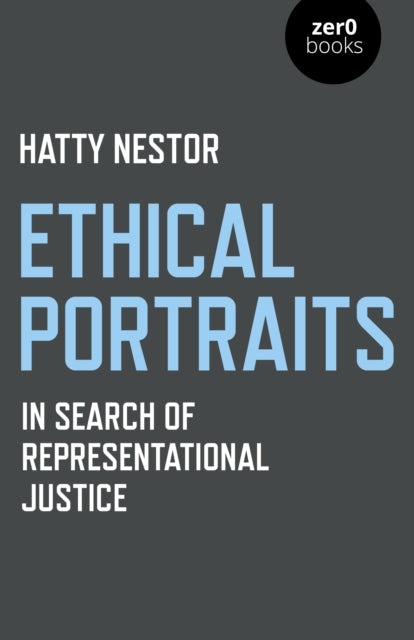Hatty Nestor
Ethical Portraits - In Search of Representational Justice
Ethical Portraits - In Search of Representational Justice
YOU SAVE £2.49
- Condition: Brand new
- UK Delivery times: Usually arrives within 2 - 3 working days
- UK Shipping: Fee starts at £2.39. Subject to product weight & dimension
Bulk ordering. Want 15 or more copies? Get a personalised quote and bigger discounts. Learn more about bulk orders.
Couldn't load pickup availability
- More about Ethical Portraits - In Search of Representational Justice
Prisons dehumanize the imprisoned through mugshots and surveillance recordings, minimizing empathetic encounters and exacerbating inequality. Ethical Portraits explores the representation of prisoners in the US criminal justice system, highlighting the failure to represent them humanely and the importance of understanding the visual representation of prisoners to confront invisible forms of power.
Format: Paperback / softback
Length: 128 pages
Publication date: 30 April 2021
Publisher: John Hunt Publishing
Prisons have a profound effect on the human rights and dignity of those who are incarcerated, dehumanizing them through a range of practices. The use of mugshots and surveillance recordings to portray prisoners as criminals, without their consent or control, further erodes their sense of self and identity. Moreover, the criminal justice system in the United States perpetuates inequality and marginalizes those who are already vulnerable, limiting opportunities for empathetic encounters and rehabilitation.
It is essential to understand how prisoners are portrayed by the carceral state and to explore strategies for countering or recuperating this representation. One way to address this issue is through the study of ethical portraiture, which examines the ways in which artists and photographers have portrayed prisoners over time. Ethical portraiture seeks to challenge the dominant narratives and stereotypes associated with incarceration, highlighting the human rights and dignity of those who are incarcerated.
Through wide-ranging interviews and creative nonfiction, artist and researcher Hatty Nestor explores the different roles that prison portraiture plays in the criminal justice system. She examines the use of courtroom sketches, DNA profiling, and the incarceration of Chelsea Manning as examples of how prison portraiture is used to perpetuate stereotypes, control narratives, and marginalize prisoners.
Nestor argues that prison portraiture is not just a visual representation of prisoners; it is also a tool of power and control. Courtroom sketches, for example, are often used to influence juries and shape public opinion, while DNA profiling is used to perpetuate the myth of genetic determinism and justify the disproportionate incarceration of certain racial and ethnic groups.
In addition to examining the ways in which prison portraiture is used to perpetuate inequality and marginalize prisoners, Nestor also explores the potential for resistance and recuperation. She highlights the work of artists and photographers who have challenged the dominant narratives and stereotypes associated with incarceration, using their work to promote empathy and understanding.
One example of this is the work of photographer Brandon Stanton, who has spent years documenting the lives of prisoners around the world. Stanton's photographs humanize prisoners and challenge the stereotypes associated with incarceration, highlighting the complex and diverse experiences of those who are incarcerated.
Another example is the work of artist and activist Ai Weiwei, who has used his art to raise awareness about human rights abuses and political oppression. Ai Weiwei's work often involves the use of prison portraiture, as he seeks to draw attention to the plight of those who are incarcerated and to challenge the power of the state.
In conclusion, prisons systematically dehumanize the imprisoned, and the use of mugshots and surveillance recordings to portray prisoners as criminals further erodes their sense of self and identity. The criminal justice system in the United States perpetuates inequality and marginalizes those who are already vulnerable, limiting opportunities for empathetic encounters and rehabilitation. Understanding the visual representation of prisoners and exploring strategies for countering or recuperating this representation is essential for promoting human rights and dignity in the criminal justice system. Through the study of ethical portraiture and the work of artists and activists who challenge the dominant narratives and stereotypes associated with incarceration, we can work towards a more just and equitable society.
Weight: 134g
Dimension: 141 x 217 x 10 (mm)
ISBN-13: 9781789040029
This item can be found in:
UK and International shipping information
UK and International shipping information
UK Delivery and returns information:
- Delivery within 2 - 3 days when ordering in the UK.
- Shipping fee for UK customers from £2.39. Fully tracked shipping service available.
- Returns policy: Return within 30 days of receipt for full refund.
International deliveries:
Shulph Ink now ships to Australia, Belgium, Canada, France, Germany, Ireland, Italy, India, Luxembourg Saudi Arabia, Singapore, Spain, Netherlands, New Zealand, United Arab Emirates, United States of America.
- Delivery times: within 5 - 10 days for international orders.
- Shipping fee: charges vary for overseas orders. Only tracked services are available for most international orders. Some countries have untracked shipping options.
- Customs charges: If ordering to addresses outside the United Kingdom, you may or may not incur additional customs and duties fees during local delivery.


